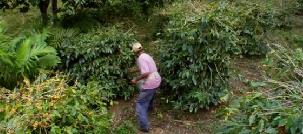Ethical Sourcing – Coffee
Building a Future with Farmers: Committed to 100% Ethically Sourced
We take a comprehensive approach to ethical sourcing, using responsible purchasing practices; farmer support; economic, social and environmental standards; industry collaboration and community development programs.
The cornerstone of our approach is Coffee and Farmer Equity (C.A.F.E.) Practices, one of the coffee industry’s first set of sustainability standards, verified by third-party experts. Developed in collaboration with Conservation International (CI), C.A.F.E. Practices has helped us create a long-term supply of high-quality coffee and positively impact the lives and livelihoods of coffee farmers and their communities.
 C.A.F.E. Practices includes guidelines in four key areas: quality, economic accountability and transparency, social responsibility and environmental leadership. Taken together, the standards help farmers grow coffee in a way that’s better for both people and the planet. These include:
C.A.F.E. Practices includes guidelines in four key areas: quality, economic accountability and transparency, social responsibility and environmental leadership. Taken together, the standards help farmers grow coffee in a way that’s better for both people and the planet. These include:
Product Quality
All coffee must meet our standards for high quality
Economic Accountability and Transparency:
Economic transparency is required. Suppliers must submit evidence of payments made throughout the coffee supply chain to demonstrate how much of the price that we pay for green coffee gets to the farmer.
Social Responsibility:
Measures evaluated by third-party verifiers help protect the rights of workers and ensure safe, fair and humane working and living conditions. Compliance with minimum-wage requirements and prohibition of child and forced labor is mandatory
Environmental Leadership
Measures evaluated by third-party verifiers help manage waste, protect water quality, conserve water and energy, preserve biodiversity and reduce agrochemical use
We believe in the continuous improvement of our suppliers and know objective measurement and evaluation is critical. Farms and mills are evaluated by third-party verification organizations overseen by SCS Global Services. All of the information we receive from farmers, suppliers and stakeholders allows us to continually improve C.A.F.E. Practices and make farmer participation more meaningful and relevant
Important additions to the program include practices for supporting the long-term productivity of coffee farms through coffee renovation, or replanting. Additionally, tracking climate change impacts and creating adaptation plans are encouraged to minimize the effects farmers experience from climate change.
We are committed to not only increasing our own C.A.F.E. Practices purchases, but also to making the program available to the entire coffee industry – even competitors. We opt for an “open-source” approach, sharing our tools, best practices and resources to help all producers make improvements in the long-term sustainability of their farms. We are continuously improving this program by working with groups such as Conservation International to measure the true impact our purchasing programs have on participating farmers and producers.
Our Farmer Support Centers are available to support farmers interested in participating in C.A.F.E. Practices and in creating farm management and work plans to achieve their goals. This includes the work we’re doing at Hacienda Alsacia, the coffee farm we bought in Costa Rica in 2013. Not only is it an operational coffee farm, it’s an agronomy research and development center that will help us continue to develop sustainable farming practices we can share with farming communities around the world.

The Starbucks and Conservation International partnership supports coffee farmers in mitigating the impacts of climate change.
Measuring the Impact of C.A.F.E. Practices

See the most recent results of how the C.A.F.E. Practices program impacts people, products and the planet. Read the report.




